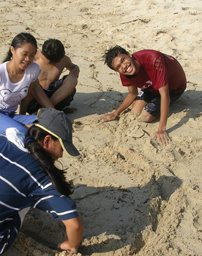
I would like to make a reflection of who friends are for me. Why are they worth keeping in one's life?
In my own experience, friends are rare to find. They are freely given to us like God sent blessings that, in the first place, we have not really worked hard for. No amount of hard work can guarantee getting the friends we like. Now this makes it even more difficult for many of us who would like to gain as much control over certain relationships we have.
We all experience being a friend to somebody. So the best gauge of talking about friends is our own self. A friend to someone for me is a companion to that somebody. That is enough and it is everything a friend is for. That is what we do; we accompany. A friend is not a repository of all our needs. S/he too is a human being like us, with limitations and needs. The frustrations are a result of expecting too much.
What is fascinating about friends is not that they give or provide, but that they bring out what we have. “Show me your friends and I will tell you who you are.” A lot of truth is said in this old aphorism. To be in the company of a friend means to share laughter with her/him, to become objective, accepting and honest with ourselves. We can, therefore, expect to become most ourselves in the company of friends. Who else can bring out these best things in us?
So what now? After I come to see more clearly their value, I become more aware of what my part is. Yes, they are gifts freely given to me; however, this does not mean I do nothing. I can do something; I can keep them.
We are so used to expending things and disposing of them once they get worn out—like clothing, personal stuff, cars, houses, etc. But, I suppose you all agree with me if I say that we cannot just afford to do the same with those people we care about. The moment we find them, we make efforts to keep them. Many do not see yet the fact that they too cannot stay there for long; they too can be worn-out by time. So while we have them, it is best and wise that we learn to keep them. Just like in any relationship, friendships grow in time. So only in time can we work the art of keeping each other. When you listen to someone and just allow time to pass without interrupting, without judging, you may not be aware but you are already keeping the person. The many pats on the back to affirm or console someone, the heart moving words “You did a good job!” or “I’m sorry…” and even the freeing moments of giving space. All of these are what build and keep friendships moving and going.

This Christmas season, start a habit, not so much of expending but of learning how to keep.
Distance makes friendship last,Respect preserved.In Michaelangelo's Creation,The Creator touched Adam across a gapIgniting a spark of life,Bridging Heaven and Earth,Immortality and man. Dr. Abe Rotor
















